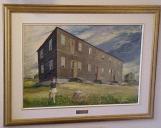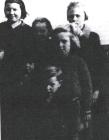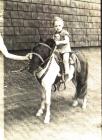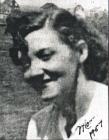1
The French Block painting.24 February 2004
Glace Bay Heritage Museum, 14 McKeen Street, Glace Bay, Nova Scotia

2
The French Block, a painting by H. Victor Newton, later to become Audrey Currie's husband."As a child I lived in tenement building near the sea in the coal mining and fishing town of Glace Bay, Nova Scotia. The old frame building housed six families and was known as the "Block". The "Block" was dilapidated, worn out. Its rectangular shape stretched high and long against the barren fields on their way to the sea. Shingles were missing, steps were missing and some windows displayed cardboard faces. The "Block" was like an old workhorse...giving out."
The reading is an exerpt taken from the works of Audrey Currie Newton.
4
Audrey Currie."The year was 1939 when we moved from North Street to South Street. We climbed the stairs to the four rooms in the end apartment that would be my home for the next eight years. I remember with great affection all the children and adults that lived there. We lived in the end apartment upstairs over the Martins. Next to us, over the Gimlets, were the Trenchards, a large family with ten children at home. Next to the Trenchards on the end over the Whalens were the Canns."
The reading is an exerpt taken from the works of Audrey Currie Newton.
6
Roddie Currie."Mittens, colourful, cozy green and red mittens. And they went right up under my coat sleeves. Ma Martin knit them especially for me. The first day I wore them to school in a bitter cold driving sleet, skirting Seaview Street, Roddie, Gerald and I walked around the old ballpark to escape the biting wind, staying close to the wavering old frame that once guarded the park. Roddie had fallen back a few paces and Gerald and I waited for him to catch up. Gerald was tough, and for the most part, jolly, with his hands thrust deep in his pockets. He said, "Come on Rod, we're going to be late". I looked at my older brother and he was so cold and miserable and pale, I was overcome with pity for him. I pulled off the colourful mittens and Gerald and I tugged them on to Roddy's frozen hands, all the while I was insisting that I hated the mittens. They itch. And if he didn't put them on, too bad, I was going to throw them in the snow. The next day however, when Roddy did not die and the weather improved, I insisted on the return of my mittens, especially when he was snowball fighting with them."
The reading is an exerpt taken from the works of Audrey Currie Newton.
8
Gerald Currie, who died at a young age from a blood disorder."It's summer, isn't it Mom? Yes Gerald, and you'll be coming home soon. Ah, Mom, I'm never coming home. She tousled his blonde hair and laughed at him, after all, he really was a normal, healthy, even robust boy of eleven. And his illness has been sudden. He would be home soon she reassured him and herself. She watched from the window upstairs as they carried the small coffin carefully and deliberately, not forgetting the steps that were missing. I stood watching, feeling the warm shingles against my back. It was so quiet I could even hear the flies buzzing. Suddenly there was a loud crack. I turned to see a man with hammer in hand hanging a green flowering wreath on a nail he had just driven into the side of the porch. And I heard Mrs. Whalen say to Mrs. Trenchard , "God love him, the last thing he said was, "Get my shoes nurse, I'm going home."
The reading is an exerpt taken from the works of Audrey Currie Newton.
10
Joe Allen Currie."The winter of '46 was especially hard. It had nothing to do with my father's business because he didn't have one, or a job either. After five years there was a new baby on the way. They name him Joe-Allen. He was born in January, and it was bitter cold. He cried a lot. The chairs were put to the axe for fuel and I braved the icy wind many times to borrow Carnation milk for his pop bottle with the nipple."
The reading is an exerpt taken from the works of Audrey Currie Newton.
12
Lily Currie."Mother's Day. Time to retrieve Lily's letters from my memory box, a ritual I have maintained since her death in 1972. Each time I read my mother's words, I realize how loved and special I was as her only girl in a brood of seven. Lily was a feminine, natural woman, passionate in her beliefs and eager to instruct me in her ways. Her sound advice still echoes in me today:
Always look after yourself first and you will be able to look after someone else.
Take a few minutes each morning to groom yourself--someone is looking at you.
When you marry, remember, the kitchen is for cooking, the living room for relaxing with family and friends, but the bedroom is a private domain of love and intimacy where you never bring your anger or cares of the day.
Smile at your husband across a crowded room.
Believe in glad tomorrows, they're sure to come.
You have a beautiful smile, give it away every day and it will come back to you.
Your life is a gift from God, so thank Him."
"When I look in the mirror, I see her face in mine," Audrey Currie.
The reading is an exerpt taken from the works of Audrey Currie Newton.
13
Neena, Hughena, Lucy, Llewelyn Whalen; Audrey Currie, Vina Curnew and Verna Martin.1942
Glace Bay, Nova Scotia

14
Neena, Hughena, Lucy and Llewelyn Whalen; Audrey Currie, Vina Curnew and Verna Martin."We were six families, we were for a time one family caring for one another, coming together in times of trouble, helping in anyway possible even with quiet understanding. Quarrelling and bickering when hositilities overflowed, yet all living and sharing on one common ground, believing in better things and bright tomorrows. That's what kept them going, especially the women, they had much to bear but they had the faith and hope to sustain them and they passed this onto their children."
The reading is an exerpt taken from the work of Audrey Currie Newton.




